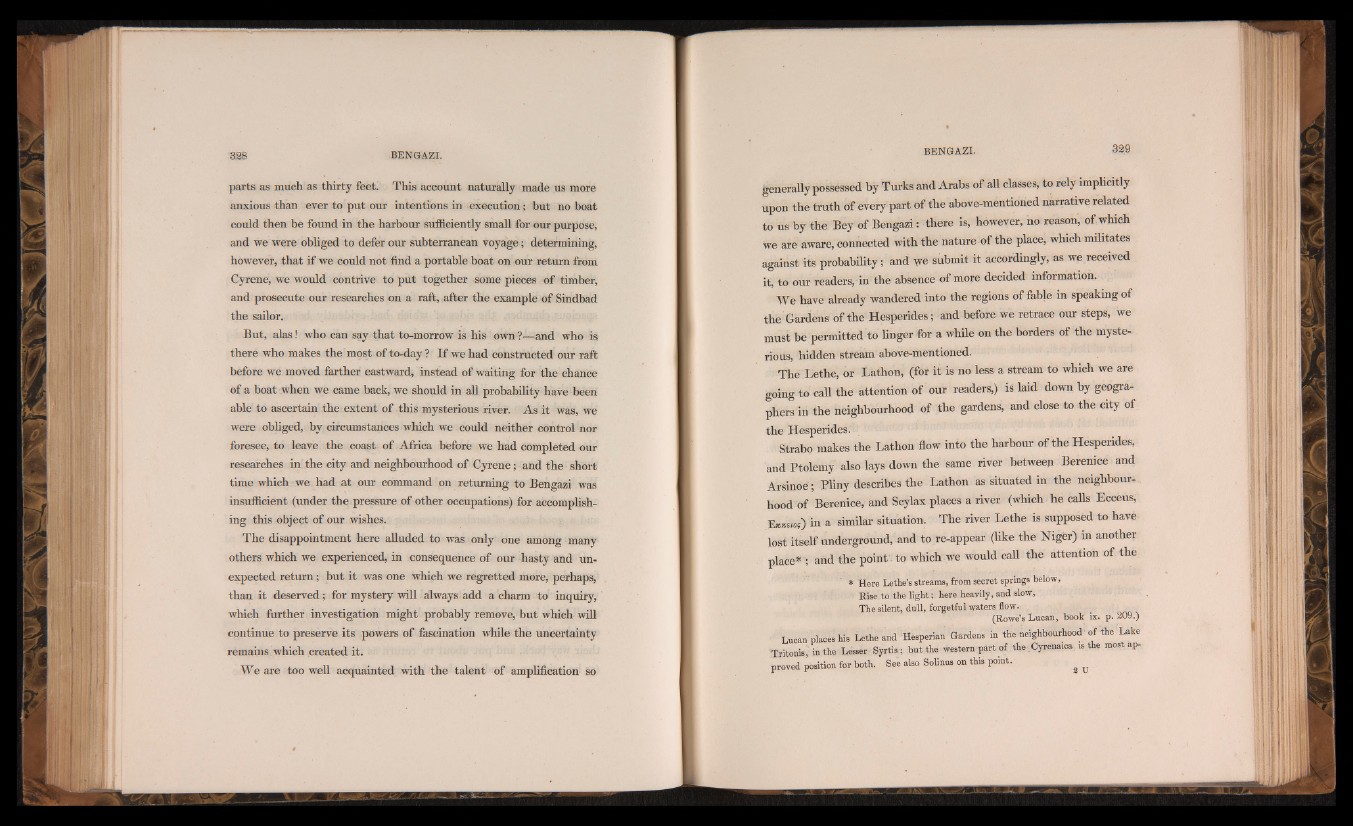
parts as much as thirty feet. This account naturally made us more
anxious than ever to put our intentions in execution; but no boat
could then be found in the harbour sufficiently small for our purpose,
and we were obliged to defer our subterranean voyage; determining,
however, that if we could not find a portable boat on our return from
Gyrene, we would contrive to put together some pieces of timber,
and prosecute our researches on a raft, after the example of Sindbad
the sailor.
But, alas! who can say that to-morrow is his own ?-—and who is
there who makes the most of to-day ? I f we had constructed our raft
before we moved farther eastward, instead of waiting for the chance
of a boat when we came back, we should in all probability have been
able to ascertain the extent of this mysterious river. As it was, we
were obliged, by circumstances which we could neither control nor
foresee, to leave the coast of Africa before we had completed our
researches in the city and neighbourhood of Cyrene; and the short
time which we had at our command on returning to Bengazi was
insufficient (under the pressure of other occupations) for accomplishing
this object of our wishes.
The disappointment here alluded to was only one among many
others which we experienced, in consequence of our hasty and unexpected
return; but it was one which we regretted more, perhaps,
than it deserved ; for mystery will always add a charm to inquiry,
which further investigation might probably remove, but which will
continue to preserve its powers of fascination while the uncertainty
remains which created it.
We are too well acquainted with the talent of amplification so
generally possessed by Turks and Arabs of all classes, to rely implicitly
upon the truth of every part of the above-mentioned narrative related
to us by the Bey of Bengazi: there is, however, no reason, of which
we are aware, connected with the nature of the place, which militates
against its probability; and we submit it accordingly, as we received
it, to our readers, in the absence of more decided information.
We have already wandered into the regions of fable in speaking of
the Gardens of the Hesperides; and before we retrace our steps, we
must be permitted to linger for a while on the borders of the mysterious,
hidden stream above-mentioned.
The te th e , or Lathon, (for it is no less a stream to which we are
going to call the attention of our readers,) is laid down by geographers
in the neighbourhood of the gardens, and close to the city of
the Hesperides.
Strabo makes the Lathon flow into the harbour of the Hesperides,
and Ptolemy also lays down the same river between Berenice and
Arsinoe ; Pliny describes the Lathon as situated in the neighbourhood
of Berenice, and Scylax places a river (which he calls Ecceus,
B*xsio?) in a similar situation. The river Lethe is supposed to have
lost itself underground, and to re-appear (like the Niger) m another
place* ; a n d the point to which we would call the attention of the
* Here Lethe’s streams, from secret springs below,
Rise to -the light; here heavily, and slow,
The silent, dull, forgetful waters flow. . .
(Rowe’s Lucan, book ix. p. 209.)
Lucan places Ms Lethe and Hesperian Gardens in the neighbourhood’ of the Lake
Tritonis,'in the Lesser Syrtis ; but the western part of th e . Cyrenaica is the mos approved
position for both. S e e a l s o Sohnus on this point.